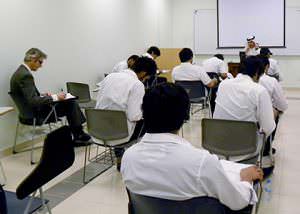Time for an end to macho lesson observation practice

I was taking part in a consultancy inspection at a college recently when I became incensed by the twisted rhetoric of some ‘inspectors’.
Comments such as: “You can ‘sniff’ the grade after 10 minutes,” and “20 minutes should be enough for them to impress you,” betray not just an unforgivable laziness, but a wholehearted missing of the point. It’s time for an end to this macho lesson observation practice.
If you’re one of these inspectors, or perhaps worse still, one of the senior managers in an educational institution who commissions consultancy inspections, then you need to flick a mental switch. Here’s three short phrases that should help:
Every system has an impact.
Do you know the impact you’re having?
Is it the one you want?
I don’t even want to begin discussing whether or not you can make an accurate judgement about the quality of a lesson if you’re only in the room for 20 minutes – it’s a red herring. An internal quality system, and so any internal or commissioned observations, should produce one major impact on teachers: it should motivate them to invest their own time in the development and practise of their pedagogic skills.
The real impact of a 20-minute observation is to give the teacher a cast-iron route to denial: “She didn’t stay for the whole lesson, or even come back in at the end, so how could she understand the learning journey I was taking them on?” I spend a considerable amount of time dealing with teachers who have been branded with a low grade and feel like leaving the profession rather than searching out new skills.
You see, the observation isn’t time for a consultant to do his job – to gather enough evidence to justify a low grade. The observation is an opportunity to engage a teacher in an evaluation of the impact they’re having on learning and to motivate them to invest in strategies that will produce more impact and ultimately less work for the teacher. The word ‘invest’ is key here: we’ll only make an investment if there’s a payoff..
So I call on all my fellow former HMI, all the career consultants, all the consultancy agencies, all the internal observers and all the senior managers who design and commission observation systems to flick your switch. Examine your own impact for a change. Working back from there will help you understand how you should behave when you’re in that privileged seat in the classroom.
Tony Davis
Director, Centre for Creative Quality Improvement
https://ccqi.org.uk/consultancy-support/transformational-lesson-observation




Agree very much Tony!!
It is indeed a privileged seat…not often recognized by observers! Observations are unfortunately commonly viewed in a negative light and quite threatening, linked to pay awards and even job loss. (Although managers would deny this). Where have we all gone wrong???! Yes, observations should be a positive experience, prompting a non-threatening opportunity to reflect on what could be improved for the benefit of our learners. If another manager tells me I should be using ‘gapped handouts’ I think I shall throw myself under a herd of stampeding elephants!